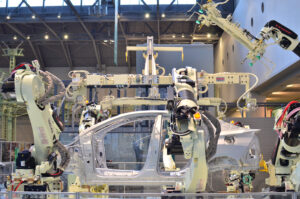Carmakers signal start of recovery

Car manufacturing in the UK rose by 5.6 per cent in its best June since the pandemic as the shortage of semiconductors and supply chain issues began to ease, figures show.
The second consecutive month of growth is a cause for optimism, the Society of Motor Manufacturers and Traders said, after supply problems slowed production in the first half of the year. Production was 19.2 per cent lower than the same period last year at 403,131 units, which is its lowest level since early 2020 and worse than levels recorded in 2009 when the global financial crisis stifled demand.
“The main cause remains shortages of key components, most notably semiconductors, exacerbated by additional supply issues caused by the war in Ukraine, as well as significant structural and model changes within the sector,” the trade body said.
The number of battery-powered electric vehicles rose by 6.5 per cent in the first half of the year and 44 per cent in June to reach record levels. The government has pledged to ban the sale of new cars with internal combustion engines in 2030 in an attempt to meet its goal of net zero emissions by 2050.
Output of hybrid, petrol and diesel cars fell by 20 per cent, 8 per cent and 60 per cent respectively in the first half of the year.
A global shortage in chips, which began last year, pushed up prices of the components, used in mobile phones and computers as well as vehicles.
Mike Hawes, the chief executive of the trade body, said: “Car manufacturers have been suffering from a ‘long Covid’ for much of 2022, as global component shortages undermine production and put supply chains under extreme pressure. Key model changeovers and the closure of a major plant last year have also impacted output, but there are grounds for optimism with rising output over the last two months.”
Investment in new technologies and processes will be essential for a return to growth, Hawes said. “High energy costs, non-competitive business rates and skills shortages must be addressed if we are to build on our inherent strengths and seize the opportunities presented by decarbonised mobility.”
Read more:
Carmakers signal start of recovery
